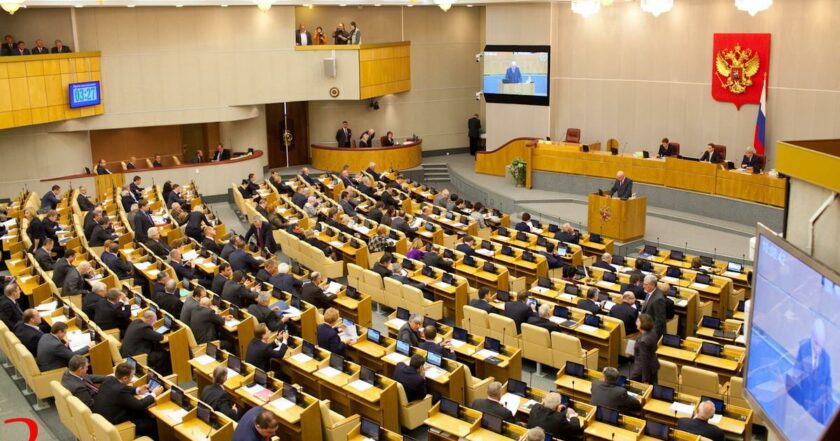Civil Network OPORA developed an online tool "War Speeches" to track the official position and public discourse of the occupying state on the course of the war against Ukraine and to forecast its future aggressive plans.
The monitoring focused primarily on statements and speeches of officials from the occupying state, as well as on official documents of government institutions.
In addition to a detailed timeline of public positions presented on the website, we offer detailed analytical reviews of the internal political situation in the russian federation in the context of the war with Ukraine.
This publication analyzes two strategies that the rf parliament uses to ensure institutional stability within the country during the unsuccessful deployment of the military campaign in Ukraine.
The Failed Plan of the state duma
Not only did the course of the unleashed war in Ukraine fail to go according to plan, russia's internal political agenda and the organization of operations of authorities in no way match the scenarios boiled in the kremlin.
Despite the consistent and long-term preparations for the war with Ukraine, for over a month now, the russian parliament has been working in a mode of chaotic and extreme measures aimed at rescuing the current system of power.
During all these days, the state duma has been fervently trying to demonstrate to society its ability to maintain the status quo and at the same time adjust to the unbearable reality that they have caused themselves.
The fact that the prepared plan did not work became clear as soon as at the end of February.
Strictly adhering to the approved work schedule, the state duma of the russian federation held its last February plenary 2 days before the outbreak of the war with Ukraine. Immediately after that, MPs went to their districts to explain to the voters the success indicators and historical significance of the "special military operation" in Ukraine.
Against the backdrop of the failure of the blitzkrieg attempting to occupy Ukraine, MPs completed their work on the grounds early, and urgently convened a plenary session on March, 3 (instead of March, 14).
The unexpected outcome of the kremlin's military venture forced the state duma to also schedule additional ad hoc meetings on March, 10 and 11. At the same time, MPs reviewed the duma's schedule for the coming months.
The dates of the plenary meetings were shifted so as to immediately launch the pipeline for the adoption of "wartime laws", and to go on vacation a week earlier than planned, for the Easter break.
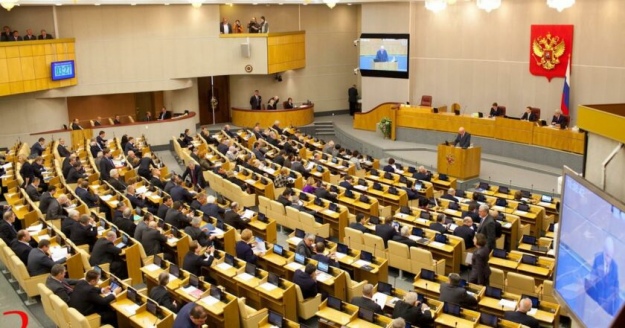
Session Hall, State Duma. Photo from open sources
It turned out that the russian parliament, commonly known for its far-sightedness, had not prepared any necessary draft laws in advance.
This came up at the most inappropriate moment (early March), when the EU, with its multi-level and protracted system of governance, was already implementing a third package of sanctions in response to the planned aggression against Ukraine.
The list with over 150 draft laws prepared a month before the war, which was to be deliberated by the State Duma at the spring session, contained none that could be promptly put to the vote.
The decision was to introduce amendments to the already registered bills in the corresponding areas that passed the first reading, instead of registering new legislative initiatives in the parliament (prepared by the government in the agony). Further, the title and content of the original text of documents were radically and unrecognizably changed.
This is how one of its architects, an MP Iryna Pankina ("Yedinaya Rossiya"), explained the technology: "In order to swiftly adopt the necessary provisions, we have included and integrated them into the draft law with a high readiness status" (quoted from a speech at the plenary session on March, 22, 2022). Thus, it was possible to circumvent the requirements of the conventional procedure with a long and gradual deliberation of draft laws in three readings.
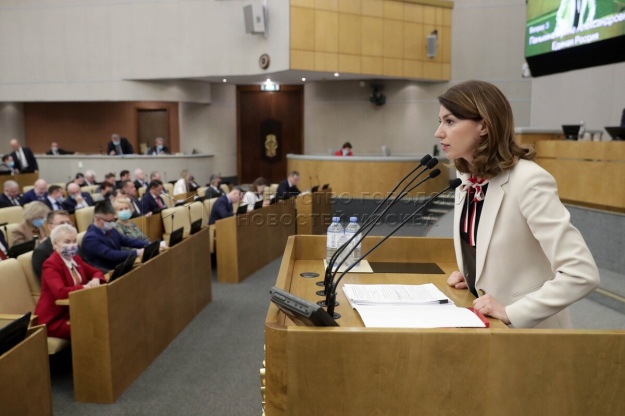
Iryna Pankina (Yedinaya Rossiya). Source
It was the approach used to approve the so-called "laws on fakes or military censorship" (laws No.31-FZ and No. 32-FZ dated March, 4, 2022).
The draft law that in its first version intended to impose criminal liability against persons who contributed to the implementation of international economic sanctions against Russia, was transformed into a law that allows to imprison those responsible for disclosing objective information about the war in Ukraine ("discrediting the armed forces of the russian federation").
The draft law which provided for the imposition of fines for financial transactions on property obtained through criminal means was transformed into the law introducing administrative liability for public actions that support or call for the imposition of sanctions against the russian federation.
The bills regulating responsibility for violation of fire safety rules were transformed by the parliament into laws introducing administrative and criminal liability for defamation of the actions of all state bodies of russia outside the country, not only of the armed forces (No. 63-FZ and No. 62-FZ of March 25, 2022).
Likewise, the draft law on the introduction of remote e-voting has been completely changed on the fly. The document that in the first reading had 7 pages and empowered the CEC to conduct online voting, in the second reading, became a detailed 160-page instruction on restricting political competition and establishing total state control over the election process (# 90-FZ dated April 1, 2022).
Along with falsifications and rewriting of previously presented draft laws, they used a more straightforward format of extreme law-making such as the registration and instant adoption of draft laws in all readings.
The algorithm was applied for the law introducing mechanisms for adapting the rf economy to international sanctions (No.46-FZ dated March 8, 2022). A comprehensive package of decisions (39 pages) amending two dozen current laws was registered the day before and deliberated by the state duma in three readings at once, in less than two hours. On the same day, it was approved at a parallel meeting of the upper house of parliament, the federation council.
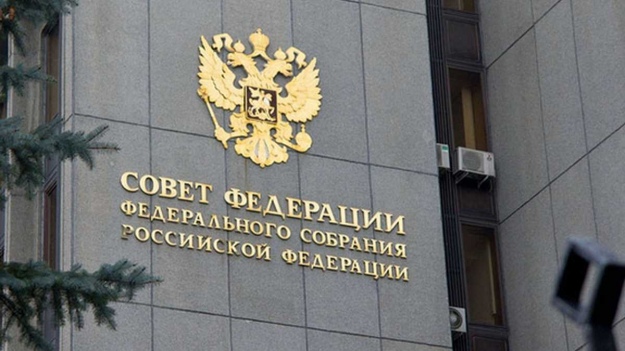
the federation council Illustrative photo from open sources
Due to overt manipulations, the entire procedure that would commonly take several weeks (submission of the draft law, familiarization of deputies with documents, making amendments, deliberation in several readings, voting by the duma and by the federation council, and, finally, signing by putin) has been now reduced to two days.
None of the MPs were even going to reassure voters that violation of the procedure is a forced step in the conditions of unpreparedness of the parliament of the russian federation for the world's response to the war in Ukraine. On the contrary, they were invited to adapt and get used to it. "We will adopt the laws in emergency mode, we will adopt laws "just-in-time," we will solve problems in the "here and now" mode – in four readings and without amendments," the rationale was explained for further actions by an MP from the "Spravedlivaya Rossiya" faction, Mikhail Delyagin (address at the meeting of the state duma on March 4, 2022).
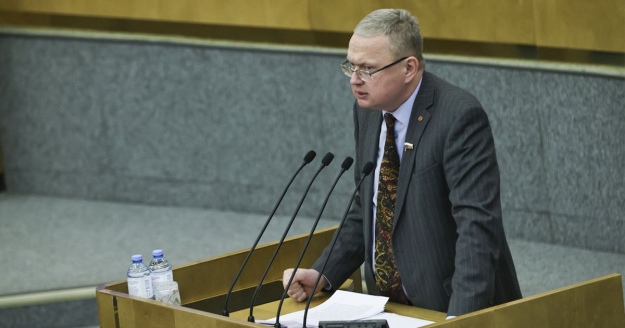
Mikhail Delyagin, "Spravedlivaya Rossiya". Illustrative photo from open sources
Country of Perpetual Martial Law
The rule of the kremlin not to call things by their names can be explained not only by the fear of admitting the fact of planned military aggression against Ukraine. It is also motivated by the desire to conceal the deployment of a special operation against their own citizens.
As a result of a number of calibrated but disguised parliamentary decisions, russian society has been accustomed to living in conditions of officially undeclared martial law for over a month now.
The state duma's efforts to restrict the rights and freedoms of citizens in their content and consequences are even more repressive than could be expected under the martial law.
According to the Law on Martial Law in rf (No. 1-FKS of January, 30, 2002), it would be worth expecting the suspension of the activities of parties or NGOs if the authorities decided that their actions undermined the defense and security of the country.
In kremlin's collective vision, the collection of signatures against war or holding peace promoting campaigns would absolutely fall under this definition. Instead of restricting their activities, all initiators or participants of such campaigns now face a real prison term.
For the public dissemination of the so-called false information about the armed forces of rf, MPs introduced a maximum punishment of 15 years in prison (Laws No. 32-FZ of 04.03.2022). This provision also applies to media people.
Instead of introducing additional control over the activities of the media, as stipulated by the martial law regime, the state duma created legal conditions where independent journalism is impossible.
Formally, without introducing war censorship (which is possible in martial law), the parliament went much further.
They censor not only criticism of the armed forces, but also any alternative opinion on the activities of all government authorities, without exception, who exercise their powers in order to presumably protect the geopolitical interests of the rf (Law No. 63-FZ of 25.03.2022). The maximum punishment for such actions is the imprisonment for up to 5 years.
In addition to the criminal prosecution of the "enemies of the people," the state duma legally obliged the Ministry of Justice to enter "national traitors" on a special register and create an expanded official register of foreign spies. Now the label could be attached not only to CSOs and the media but also to any individual.
In martial law, elections cannot be held, and all voters shall be equally limited in exercising their voting rights. On the other hand, the state duma selectively determines who and when to restrict in the passive suffrage.
Those who have been convicted for extremist crimes (even if withdrawn or canceled) or officials removed from office by the President of the rf (for example, dissatisfied regional governors) will not be able to be elected in elections at different levels for 5 years.
In martial law, citizens would clearly understand that they cannot freely hold meetings, rallies, piquets, and demonstrations.
Today, participants of independent mass events inevitably risk the detention on the basis of an expanded list of actions that the parliament of the rf proposed to consider as criminal offenses.
The Parliament also allowed executive authorities not to hold mandatory public hearings (public discussions) on urban planning and development of territories (Law No. 58-FZ of 14.03.2022).
There is no martial law officially enforced in russia but they still introduce additional measures to strengthen the secrecy regime in the operations of authorities and other organizations. In particular, the Parliament of the rf allowed the Central Bank not to disclose information about financial transactions and issuers (Law No.46-FZ).
In martial law, the state may seize property from any person or organization, if required, but it is subsequently obliged to compensate for its value. Moreover, the Parliament of the rf is preparing a legislative solution to nationalize the property of foreign companies without any compensation (bill No.103072-8 dated April 8, 2022). "Our response is not just the military economy, our answer is in economic expansion," warned the deputy of the state duma, Oleksii Nechaev (New People Party, speech at the plenary session on March, 10).
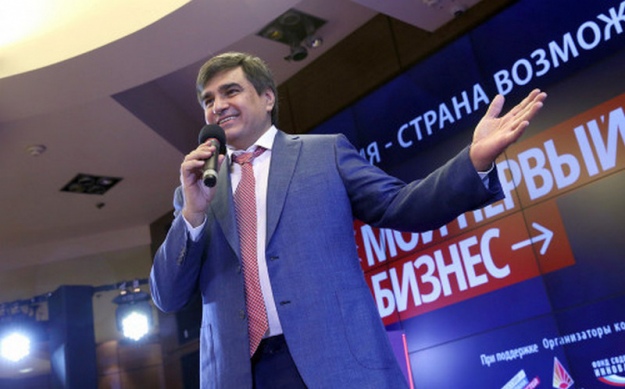
Oleksii Nechaev, New People. Illustrative photo from open sources
The advantage of the legal regime of martial law is that it has its beginning and an end. Thereafter, all legal acts adopted for its implementation shall become null and void or repealed. Instead, the totalitarian laws that the parliament of the rf hastily adopted under the pretext of a "defensive war" against the whole world are timeless.
The "special operation" of the kremlin authorities against their own citizens is successfully unfolding and will continue strictly as planned even after Ukraine wins its war.
